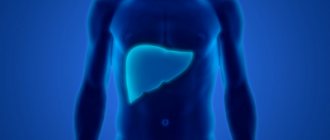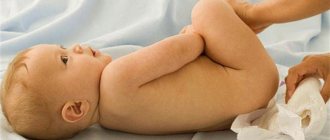The article was checked by gastroenterologist and endoscopist Kondrashova E.A. , is for general informational purposes only and does not replace specialist advice. For recommendations on diagnosis and treatment, consultation with a doctor is necessary.
At the Yauza Clinical Hospital, experienced gastroenterologists will conduct an examination, identify the causes and prescribe treatment for any stool disorders (semi-liquid, mushy, unformed stool). The clinic has all the capabilities to diagnose diseases of the digestive tract (endoscopy of the stomach, duodenum, colon, rectum with biopsy, special laboratory tests, examination of the gastrointestinal tract using computed tomography and ultrasound).
Normally, feces consists of 30% water and 70% dry residue - processed food bolus, dead cells of the intestinal wall and epithelium. If there is a violation of the processing and absorption of food, its evacuation, or an imbalance of the microflora, the nature of the stool changes. The cause of the appearance of semi-liquid, mushy feces can be various diseases of the gastrointestinal tract (GIT), as well as diseases not directly related to intestinal damage. At the Clinical Hospital on Yauza, you can undergo an examination of the whole body as a whole and determine the true causes of loose stools.
Causes of semi-liquid stools
- intestinal infections (food poisoning, dysbacteriosis)
- inflammatory diseases of the digestive system (hepatitis, pancreatitis, cholecystitis, cholelithiasis, enterocolitis, Crohn's disease)
- irritable bowel syndrome - increased passage of food bolus through the intestinal tube
- allergic reaction to medications or foods
- enzyme deficiency (lack of lactase to digest milk)
- stress and physical strain
- consumption of raw water and food unusual for the body
You should not look for and eliminate the cause yourself - the disease will progress. It is better to immediately contact an experienced gastroenterologist and get professional medical help. In our clinic you will find a sensitive attitude, an individual and comprehensive approach, convenience and comfort, which contributes to effective examination and treatment.
Diagnostic stages
The search for the causes of loose stools begins with a consultation with a specialist doctor. The gastroenterologist will conduct a detailed survey and physical examination in order to determine the nature of nutrition, constitutional traits, features of the development of disorders, and psychogenic factors that led to the emergence of the problem.
The patient will undergo a laboratory examination with blood, urine, stool tests (for microbial contamination of the gastrointestinal tract, helminthic infestations, biochemical examination of stool), and, if necessary, a wide range of tests for allergens. New endoscopic equipment with the possibility of gastroduodenoscopy, colonoscopy, sigmoidoscopy and biopsy taking, including ultrasound screening under anesthesia, computed tomography on a modern tomograph with the ability to conduct virtual colonoscopy - the advantages of diagnostics at the Yauza Clinical Hospital.
In addition, if necessary, you will be consulted by a surgeon, allergist, neurologist, psychotherapist and other specialized doctors - the hospital employs specialists in more than 35 areas of medicine.
What is normal stool?
Normally, bowel movements occur regularly and without long straining. After excretion of feces, the urge completely disappears, there is no discomfort. Other indicators of normal digestion:
- daily amount of feces - 150-400 g,
- easy painless bowel movement,
- decorated cylindrical chair, 70% water,
- no strong unpleasant odor,
- stool acidity 6.8-7.6 pH.
If stool is delayed for 3 days or more, the urge to go to the toilet becomes frequent and painful, gas formation has increased and abdominal pain appears, measures must be taken to restore the normal frequency of bowel movements. To do this you need:
- adhere to the principles of proper nutrition - enrich your daily diet with fiber and drink at least 1.5-2 liters of liquid;
- take laxatives.
For chronic constipation, consultation with a gastroenterologist is necessary. The specialist will conduct a diagnosis, determine the cause of prolonged stool retention and prescribe effective treatment to bring bowel function back to normal.
Get rid of intestinal problems
The natural British drug is not addictive and works immediately
Find Fitomucil with benefits
Treatment
Semi-liquid stools associated with eating disorders do not require treatment - it is enough to choose a nutritious diet. If semi-liquid stool occurs as a result of a certain disease, treatment of the underlying disease and maintenance of intestinal function with the help of special drugs that normalize the digestion and absorption of nutrients (enzyme therapy), passage (Motilium, loperamide) and bacterial composition (Linex, bifiform) are required.
Specialists at the Yauza Clinical Hospital will select individual treatment, taking into account all modern medical capabilities, the severity of the disease and the patient’s needs.
You can see prices for services
Constipation in adults: looking for causes and getting rid of them
Blessed is only the one who has a chair in the morning without compulsion, He has food according to his gut, and all pleasures are available to him.
From these lines, the authorship of which is attributed to Pushkin, one can indirectly judge that the problem of constipation was at least known already in the time of the great poet. Unfortunately, it does not lose its relevance today.
We talked about the problem of constipation in adults with Ayuna Khabinichnaya Mikhailova, Candidate of Medical Sciences, gastroenterologist at the Expert Clinic Irkutsk.
— Ayuna Khabinichna, in what cases can we talk about constipation in an adult? What it is?
Based on the definition, constipation is a syndrome (a set of symptoms) that is characterized by a violation of the secretory and evacuation functions of the large intestine. It can manifest itself in the form of rare stools (less than three times a week), characterized by thickening of the consistency of stool, difficulty in defecation (a person strains for a long time). In this case, there may be a feeling of obstruction in the rectum, or there may be a need to use some special techniques to facilitate the passage of feces. If such manifestations persist for more than three months, they speak of chronic constipation.
Constipation is conventionally divided into functional and organic. With functional constipation, there is only a violation of contractions of the intestinal wall and there is no organic pathology of the colon.
Why does constipation occur in an adult? What are its reasons?
Among them:
- a certain—in particular, “Western”—style of eating. It is characterized by a low content of plant fibers;
- reduced amount of fluid a person takes during the day;
- irregular or changing diet;
- elderly age. Such constipation is explained by age-related changes in intestinal contractility, weakness of the pelvic floor muscles, and some concomitant diseases;
- sedentary lifestyle;
- irritable bowel syndrome, one of the forms of which is characterized by a predominance of constipation;
- pregnancy;
- strictures (narrowing) of the colon;
- colon cancer;
- anal fissure, hemorrhoids;
- Hirschsprung's disease;
- parkinsonism;
- multiple sclerosis;
- systemic metabolic disorders - in particular, hypothyroidism, diabetes mellitus;
- taking a number of medications (constipation as one of the side effects). Such medications may include calcium channel blockers, iron supplements, antihistamines;
- some mental illnesses (for example, depression).
I would like to note this point as well. It is very important to pay attention to the so-called “symptoms of anxiety”, a kind of “red flags”: their appearance is a reason to immediately consult a doctor. Among them:
- acute constipation, which occurred suddenly, against the background of complete health and normal bowel movements;
- the appearance of blood and pus in the stool;
- weight loss, fever, general weakness, loss of appetite.
— In children there is such a thing as psychological constipation. Does this happen in adults?
If we talk specifically about the fear of defecation, as is observed in children, then in adult practice I have never encountered such a phenomenon. However, for example, a situation is possible when the act of defecation is difficult for a person due to an upcoming flight (lack of time) or during it; due to the lack of a toilet nearby, etc. In this regard, a person has to suppress the urge to defecate. That is, these are rather situations that can lead to constipation.
- How can you find the cause of constipation? What diagnostic methods are used for this?
First of all, you need to conduct a detailed survey of the patient, finding out the nature of the diet, food intake, volume of liquid drunk, all characteristics of bowel movements (frequency, consistency of stool, presence of pain during bowel movements, etc.), and the presence of any other symptoms.
Then the doctor examines the patient (including the anorectal area), probes (palpates) the abdomen.
Colonoscopy
After this, depending on the doctor’s assumptions, instrumental research methods are prescribed. Among them, the main method is colonoscopy, an X-ray examination of the intestines with barium. Special tests may also be prescribed to study bowel function.
More information about the video colonoscopy procedure can be found here.
— What are the possible consequences of constipation in adults?
— First of all, this is a violation of the quality of life: the patient may develop a psychological dependence on the problem. Constipation prevents a person from living, working, and developing.
Constipation increases the likelihood of anal fissure, hemorrhoids, diverticular disease and oncological pathologies of the colon. If feces are retained for a long time (a week or more) in the colon and are absorbed into the blood, intoxication (poisoning) with intestinal contents is possible. Ischemia (circulatory failure) may develop in the mucous membrane of the large intestine, and cells of the mucous membrane may be damaged.
— What to do if an adult has constipation? How to adjust a chair?
Treatment of constipation in adults is as follows. It is important to analyze the patient's lifestyle. First of all, you need to regulate your diet. You should eat at least 400 grams of vegetables and fruits per day. The amount of plant fiber (dietary fiber) as such should be at least 20-25 grams per day. Its source is, for example, bran - they can be taken if, for some reason, vegetables and fruits are not available to a person. However, some bloating and abdominal pain may be a side effect of bran, so some people may not take bran because of these symptoms.
Equally important is regularity of nutrition, with a mandatory, moderate-calorie breakfast, and not a late dinner.
The volume of liquid consumed daily is about 2 liters. It is useful to drink 1-2 glasses of water at room temperature in the morning. Drinks containing caffeine have some laxative effects.
You need to move enough. This is at a minimum walking at least 3 times a week for 40 minutes. Movement increases intestinal motility. Alternatively, you can work out on a treadmill and ride a bike.
It is important to try to develop a certain mode of bowel movement, that is, at a set time of day - a kind of automatism, a reflex. Even if at first there is no act of defecation, over time it can improve and “become attached” to time. It is also necessary to take into account the patient’s position during bowel movements - the so-called “eagle pose”, when the knees are pulled up to the stomach, with a low chair under the feet.
Now about drug treatment. Laxatives are used. These are primarily drugs that increase the volume of intestinal contents. One example is lactulose-based drugs. It is a synthetic, non-absorbable complex carbohydrate classified as an oligosugar. The plant used is psyllium. Another group is drugs that enhance intestinal contractions.
In order to eliminate constipation that appears against the background of another disease, it is necessary to treat this disease.
It must be remembered that working with the large intestine is quite painstaking and relatively long.
— How to prevent the development of constipation in an adult?
Need to:
- eat rationally. In this concept, I include not only a balanced diet with all necessary substances, but also the regularity of food intake (at least 3 times a day). Fresh fruits and vegetables, which can increase gas formation, are best eaten in the first half of the day.
- move. Alternatively, walk for 40 minutes 3 times a week. It's minimum. If for some reason this is not possible - for example, due to joint pathology - then walking should be replaced with physical exercises individually selected by the doctor.
- drink about 2 liters of fluid per day;
- treat diseases that may cause constipation.
You can make an appointment with a gastroenterologist at the Irkutsk clinic here. ATTENTION: the service is not available in all cities
The editors recommend: Is it possible to check the large intestine without endoscopy? We are talking about virtual colonoscopy. The risk is on the verge. How was Helicobacter pylori discovered? Attention, echinococcosis!
For reference:
Mikhailova Ayuna Khabinichna
Graduate of the Faculty of General Medicine of Irkutsk State Medical University in 1996.
In 1997 she completed her internship in therapy.
From 2001 to 2003 - clinical residency in gastroenterology.
In 2009, she completed a correspondence postgraduate course in gastroenterology. Has an academic degree of Candidate of Medical Sciences.
Currently, he is a gastroenterologist at the Expert Clinic, Irkutsk. Receives at the address: st. Kozhova 9A.











